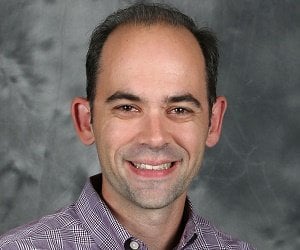Ask any doctor, in any specialty and of any age, and they will remember their training in medical school. It is full of learning, new experiences, new friends, and major strides in both personal and professional development. With so many changes, dozens of obstacles in each student’s life must be confronted and overcome. Fortunately, medical schools have extraordinary people who devote their time and talent to guiding and supporting medical students through their four years. This column interviews these people at medical schools around the country to help students learn more about the resources they have available during their years in school.
In our first installment, I interviewed Mr. Chris Diem. Mr. Diem is the Program Coordinator for the Office of Academic Support Services at Texas A&M College of Medicine.

Please summarize your role at the medical school.
I am one of two people who work in the Office of Academic Support Services. I work with 1st through 4th year medical students on a variety of needs, including block exam analysis, study skills, OSCE (Objective Structured Clinical Examination) remediation and training, Step 1 and 2 preparation, shelf exam preparation, and Match/residency preparation. Specifically, I am based out of our Temple campus but also work with students in Round Rock and Dallas. The other person in our office covers the College Station and Houston campuses.
How common is your position at medical schools? Is it a traditional position or a newly developed one?
There are positions similar to ours at schools around the country. At some places, there is one person for the entire Health Science Center while our schools have numerous academic support professionals per college. These positions are housed in a variety of locations. Some are independent departments, some are housed in Student Affairs, like we are, and some are housed in Academic Affairs.
Why did you choose to become a program coordinator?
I spent 13 years in K-12 public education, consisting of 3 years as a substitute teacher, 4 years as a classroom teacher, 3 years as an assistant principal, and culminating in 2.5 years as a Campus Principal and District Program 504 Coordinator. After nearly 6 cumulative years as an administrator, I had the desire to move into a position that worked more closely with students on a daily basis and sought one in higher education as that had become a personal career goal. My undergraduate degree is from Texas A&M so when I saw the job description for this position, I realized it could be the perfect combination of everything I was looking for.
Why did you choose to work at a medical school?
The idea of working with students on a daily basis who had reached their end educational goals and were now one step away from achieving a significant milestone was intriguing to me. I figured I would find highly motivated and dedicated students to work with and that has been the case since day one.
Are there unique challenges to your role at a medical school?
This office serves as a catch-all for the students. We are constantly fielding questions that students ask us because they’re not sure where they should go. In many cases we get them pointed in the right direction and in other cases we seek to learn about their concern because it could help with future students. Because of the rapid pace of medical school and the importance of getting answers quickly, this often becomes something we need to address and address quickly.
Is there anything that surprised you when working at a medical school?
The language of education is fairly universal. I was worried about learning how to “speak medicine” and, while that has been something I’ve worked on in the last three years, the same general learning principles that applied in K-12 education are easily translated into medical education. Group study, time management, learning through repetition, active learning models… all good teaching strategies in K-12 and in medical school. I think the number of learning disabilities (ones previously identified and newly identified since entry into medical school) was surprising.
Has your view of your work changed since you began working with medical students?
I feel more valued by this student population than any other I’ve worked with. They are appreciative, thankful, grateful… the work is not always easy and the amount of stress students are under in medical school is at a level I’ve never seen… but they’re amazing!
Please describe a typical day in your shoes.
There’s not a typical day… if there is a test coming up then I’m working with students on their previous exam analysis and giving advice for how to study for the next exam. If we’re in Step 1 season, then most of my days are working with study calendars and practice exams. In the weeks before ERAS (Electronic Residency Application Service), we’re looking at personal statements, CV’s, and applications. If I’m in Temple, I’m likely to get 6 drop-in appointments on top of my regular schedule… if I’m in Dallas or Round Rock, then it’s more structured due to more limited time because of travel. Every day is truly unique!
What is your favorite part of your job?
Seeing students succeed… no matter how big or small the victory may be. My first group of M1’s are now M4’s and just applied for residencies. For some students I wondered if we would get there, and we have. The pure joy associated with their success makes this job immensely rewarding.
What is the hardest part of your job?
Seeing hard working students come up short. My toughest day at work was the first time a student in remediation failed; I took it very personally. I still take their failures personally though have come to realize there is only so much I can control.
Can you share any especially memorable experiences you have had serving in your position?
Match Day 2017… seeing students I had worked closely with since before Step 1 find out where they were going was amazing!
Is there any general advice you typically give medical students?
Believe in yourself and just go do it! So many times the fear of failure prevents students from being successful… taking the first step, putting their head down, and trying their best will more often times than not lead to good things. Don’t be afraid to ask for help, and don’t wait! Medical school goes at a breakneck pace. Every day counts.

